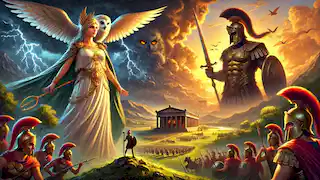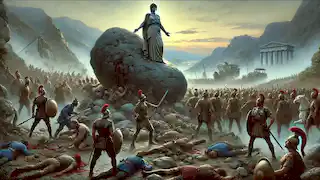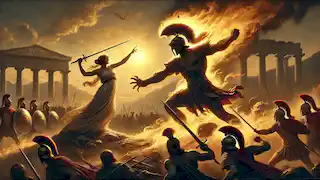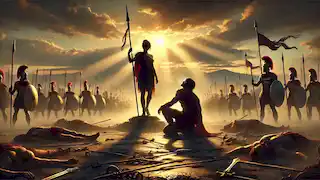The Tale of Athena and Ares
Reading time: 10 min

About this story: The Tale of Athena and Ares is a Myth from Greece set in the Ancient This Dramatic tale explores themes of Wisdom and is suitable for All Ages. It offers Cultural insights. The epic clash between wisdom and war, where strategy triumphs over chaos.
In the heart of ancient Greece, long before the Parthenon rose to grace the Athenian skyline, two deities of Mount Olympus clashed not only in power but in the very essence of their divine roles. Athena, the goddess of wisdom and strategy, stood in constant opposition to Ares, the god of war and bloodlust. Their rivalry was legendary, a perpetual struggle that echoed through the heavens and shaped the lives of mortals on earth. This is the story of their battle, not just on the fields of war, but in their attempts to define what it truly meant to wield power.
The Rivalry of Olympus
Athena and Ares were both children of Zeus, but they could not have been more different. Athena, born from her father’s head, was a symbol of clarity and reason. She was strategic, always preferring diplomacy and calculated moves to rash violence. Ares, on the other hand, was born of Hera, his mother's jealousy and ambition manifesting in his love for chaos and destruction. While Athena sought to protect and nurture the mortal world, Ares reveled in its suffering, relishing in the bloodshed of battle.
One fateful day, a disagreement between them escalated into a full-scale divine confrontation that would not only shake the gods but ripple down into the mortal realm as well.
The Call to War
It began when a kingdom on the edge of Greece fell into turmoil. Two rival kings, both claiming rightful rule, had torn their land apart with civil war. One was favored by Athena for his wisdom and leadership; the other, by Ares, for his brute strength and military might. As their armies clashed in the valleys and plains, the gods took sides.
Athena descended from Olympus to advise her chosen king, Calchas, who ruled with an even hand and wise counsel. He was beloved by his people, and his reign had been peaceful until Ares interfered. Across the battlefield, the brutal King Pericles, chosen by Ares, reigned with an iron fist. His army was larger, his men fiercer, and his mind intoxicated with the prospect of war.
"You cannot win this battle through strength alone," Athena whispered to Calchas as she appeared in his chambers one evening, her armor shining like molten silver. "We must outthink him. There is no victory in bloodshed, only ruin."
"But how can I outmaneuver a force so large? Pericles has more men than I could ever hope to command," Calchas replied, his face lined with concern.
"You will not need more men," Athena smiled, her grey eyes gleaming with the promise of strategy. "Only patience and the wisdom to strike at the right time."
Ares' Wrath
Across the battlefield, Ares bellowed with laughter as he descended upon Pericles, his chosen king. Unlike Athena, he did not appear in dreams or offer subtle advice. He marched into the war camp with a storm of fury at his back, his crimson cloak trailing behind him like the blood of fallen warriors. Pericles knelt before him, trembling with both awe and terror.
"Rise, my warrior," Ares commanded, his voice a rumble like thunder. "I have given you the power to conquer, and conquer you shall. Tomorrow, we will crush Calchas and his pathetic army. No one shall remember the name of his kingdom, for it will be nothing but ash and dust under our feet."
Pericles grinned, emboldened by the god's promise. "What must I do, my lord?"
"Follow your instincts, unleash your fury. Let no man stand before you. I will be with you in battle, and together, we will paint the fields red."
The Battle of Skiron Pass
The next morning, the two armies faced each other at Skiron Pass, a narrow valley where the high cliffs rose like walls on either side. Athena had chosen the battlefield with care, knowing that in such a confined space, Pericles’ larger army would have less room to maneuver. Calchas stood at the head of his troops, his armor gleaming under the early morning sun, but his heart heavy with the knowledge of the destruction that awaited.

The signal was given, and the battle began.
Ares’ forces surged forward, their war cries piercing the air like the roar of a lion hunting its prey. The clash of swords and the cries of the dying filled the valley, but despite their smaller numbers, Calchas’ men held firm. Every move they made had been carefully planned by Athena. She watched from above, her owl perched on her shoulder, its watchful eyes scanning the battlefield for any sign of weakness in Pericles' advance.
But Ares was not a god to be easily outdone. He appeared in the thick of the fight, his presence igniting a new wave of ferocity among his followers. His sword flashed like lightning, cutting through soldiers as if they were mere shadows. Blood spattered his face, and his laughter echoed across the battlefield.
Calchas faltered, seeing the god of war in action. His men, too, began to lose heart.
"We cannot hold them," one of his generals shouted over the din. "They are too strong!"
Athena appeared beside Calchas then, her face calm but her eyes fierce. "Do not waver now. The tide will turn, but only if you trust in wisdom, not force."
With renewed resolve, Calchas ordered his archers to fall back and draw the enemy deeper into the pass. Ares, sensing victory, pushed Pericles to press forward, unaware that Athena had set a trap. The pass narrowed even further up ahead, and Calchas had stationed his remaining forces there, hidden among the rocks.
The Turning of the Tide
As Ares and his army charged into the narrowest part of the pass, Calchas gave the signal. His soldiers rolled massive boulders down from the cliffs, crushing dozens of Pericles’ men in an instant. Arrows rained down from above, striking with deadly precision. Trapped in the narrow confines of the pass, Pericles’ army could not retreat, and their numbers began to dwindle under the relentless assault.
Ares roared in fury, his eyes blazing with hatred. He swung his sword wildly, cutting through men and rock alike, but even he could not stem the tide of defeat. Athena watched from her vantage point, her heart steady, knowing that the battle was now hers.
Pericles, realizing the trap, tried to rally his men, but it was too late. One by one, they fell until he stood alone, his armor battered and his sword dripping with blood. He looked up at Ares, desperate for the god to save him.
But Ares, seeing the futility of the battle, vanished in a flash of red light, abandoning his champion to his fate.
The Aftermath
The victory at Skiron Pass was a turning point, not just for Calchas, but for all of Greece. News of his cunning triumph spread across the land, and his kingdom flourished under Athena’s continued guidance. Pericles, once a feared and mighty warrior, was captured and imprisoned. His name was soon forgotten, buried in the annals of history as a warning to those who would choose violence over wisdom.
Ares, humiliated and enraged by his defeat, retreated to Olympus, but his hatred for Athena only grew. He would seek revenge, but for now, the goddess of wisdom reigned supreme, her influence shaping not just battles, but the very fabric of Greek society.
The Eternal Struggle
Though Athena had won this battle, the war between wisdom and violence was far from over. For as long as men existed, the gods knew that conflict would arise, and where there was conflict, Athena and Ares would stand on opposite sides.

Generations passed, and though Ares continued to inspire warriors to seek glory in bloodshed, Athena's influence remained strong, guiding those who sought peace, justice, and reason. Their rivalry became a legend, symbolizing the eternal struggle within every heart — the choice between reason and rage, wisdom and destruction.
Even the other gods, who had watched the battle of Skiron Pass with interest, came to see Athena and Ares as embodiments of a larger cosmic force. Zeus, though proud of both his children, knew that their rivalry would shape the fate of the world for centuries to come.
A Final Duel
But the gods do not age as mortals do, and the tension between Athena and Ares could not be contained forever.
One fateful day, centuries after the battle of Skiron Pass, the two gods met again on the fields of Phlegra. The mortal world had once more descended into chaos, with cities burning and armies clashing. Ares stood at the head of a massive army, his eyes gleaming with the lust for war.
Athena appeared on the opposite hill, her armor shining in the dying light of the sun. Her face was calm, as always, but there was a fire in her eyes that had not been seen since their first battle. She knew this would be their final confrontation, a duel that would decide the balance of power on Olympus itself.
Without a word, they descended into the valley, their footsteps shaking the earth. The armies around them fell silent, watching in awe as the two gods approached each other.

Ares struck first, his sword blazing with the fires of destruction, but Athena was ready. She parried his blows with ease, her spear moving with the precision of a thousand years of training. They fought for hours, neither giving an inch, their power shaking the very foundations of the world.
But in the end, it was wisdom that triumphed over rage. With a swift, calculated strike, Athena disarmed Ares, sending his sword flying
into the dust. He fell to his knees, panting with exhaustion, his once fiery gaze dimming with the realization of his defeat.
Athena stood over him, her spear poised to strike, but she hesitated. "This is not the way," she said softly. "There is no honor in victory through bloodshed, even against you."
With that, she turned and walked away, leaving Ares kneeling in the dirt. The war god watched her go, his heart filled with a mixture of anger and admiration. Though he had lost, he could not deny the strength of her wisdom.
Legacy of the Gods
From that day forward, the tale of Athena and Ares became a lesson for all of Greece. Mortals looked to Athena as a symbol of what they could achieve through reason and strategy, while Ares remained a reminder of the destructive power of unchecked violence. Their rivalry, though it continued in the heavens, would forever shape the lives of men and women on earth.

And so, the gods watched from Olympus as the world turned, knowing that as long as there was life, the battle between wisdom and war would rage on. But in the hearts of mortals, Athena's light would always shine a little brighter, guiding them toward a future not ruled by the sword, but by the mind.


















